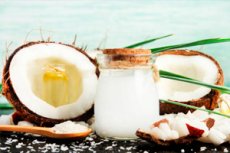New publications
Coconut Oil and Cancer: What's Really Known About Lauric Acid
Last reviewed: 18.08.2025

All iLive content is medically reviewed or fact checked to ensure as much factual accuracy as possible.
We have strict sourcing guidelines and only link to reputable media sites, academic research institutions and, whenever possible, medically peer reviewed studies. Note that the numbers in parentheses ([1], [2], etc.) are clickable links to these studies.
If you feel that any of our content is inaccurate, out-of-date, or otherwise questionable, please select it and press Ctrl + Enter.

The Journal of Xenobiotics has published a review: what unrefined coconut oil (Virgin Coconut Oil, VCO) and its main component lauric acid (LA) can do in oncology. The authors collect data from cellular and animal studies: LA and VCO can inhibit the growth of tumor cells, trigger their "suicide" (apoptosis), interfere with metastasis and - in a number of studies - enhance the effect of some drugs. Plus, VCO itself has signals that it softens the toxic side effects of chemotherapy in animals. But this is a review of early data: there is little clinical evidence, and for lauric acid itself, the effect on the side effects of "chemistry" has not yet been shown.
Background
- Why do people look at edible oils in oncology? Cancer drugs are often effective, but they have severe side effects (fatigue, nausea, liver/kidney/heart damage). Doctors are looking for safe “supportive” agents that could slightly enhance the effect of therapy or mitigate its toxicity - hence the interest in nutraceuticals and dietary components.
- Where is the gap? Most of the data is from in vitro (cells in a test tube) and animal models. These results do not automatically work in humans: different doses, bioavailability, metabolism, product quality, drug interactions. Clinical trials in humans are few and varied in design and dosage.
What exactly needs to be clarified?
- Can VCO mitigate the side effects of specific “chems” in humans (and in what doses/forms: food, capsules, emulsions)?
- Does lauric acid have an independent clinical effect or is it mainly related to the composition of the whole oil (phenols, other fatty acids)?
- Safety and compatibility: saturated fat, effects on liver/lipids, possible drug interactions.
- Response biomarkers: who will potentially benefit (by tumor type, mutations, comorbid conditions).
What exactly did the scientists analyze?
- What is VCO and LA. VCO is an oil from fresh coconut pulp without refining; it contains a lot of medium-chain fatty acids, of which 45-52% is lauric. The review lists reports on the anti-inflammatory and antioxidant effects of VCO and summarizes that in the oncocontext, LA and phenolic compounds are considered the key active components.
- Antitumor activity (in vitro/in vivo). In laboratory models of LA and VCO:
- increase the level of reactive oxygen species in cancer cells → trigger apoptosis;
- slow down division and shift cells into cycle “arrest”;
- affect growth/migration-related signaling pathways (e.g., EGFR–ERK, etc.). In separate experiments, LA increased the sensitivity of colorectal cells with KRAS/BRAF mutations to cetuximab (an EGFR-targeted drug) — this is still cellular work, but an interesting hint at synergy.
- Side effects of "chemo". According to preclinical data in animals, VCO can reduce the toxicity of some chemotherapy drugs (liver, kidneys, heart, etc.) - probably through antioxidant and anti-inflammatory mechanisms. For pure lauric acid, there is no convincing data on such a protective effect on side effects.
What does this mean in simple words
Neither oil nor lauric acid cure cancer on their own — they are a possible adjunct to therapy. In vitro and on animals, they sometimes help to target tumor cell vulnerabilities and mitigate drug toxicity (for VCO). But the bridge to a real clinic is controlled human trials, of which there are almost none. The review neatly sums up: there is potential, but studies are needed to test doses, safety, and compatibility with specific treatment regimens.
A couple of interesting details from the review
- Not all "coconut" is equally useful. The work emphasizes Virgin oil: cold production without bleaching/deodorization preserves the fatty acid profile and antioxidants.
- Different targets, same result. In a number of models, LA “hits” EGFR signaling and changes the expression of microRNAs (for example, miR-378) — mechanisms that could theoretically cut the survival of tumor cells or their resistance to drugs. But these are still mechanistic clues, not clinical protocols.
What is important to keep in mind
- This is a review of predominantly preclinical work. Laboratory effect ≠ clinical benefit.
- Edible oils are calories and fats; people with cancer often have concomitant problems with metabolism, liver, and gastrointestinal tract - self-medication with additives can be harmful.
- Possible interactions with medications and product quality (counterfeit/refined) are a separate risk. Before any experiments with diet in cancer patients - only through a doctor.
Why is such a review needed at all?
He collects disparate data and poses questions for the clinic: where does it make sense to test VCO/LA as adjuvants (e.g. in cetuximab regimens for certain mutations), what biomarkers of response to look for, and can VCO really reduce the toxicity of specific chemos in people – if so, in what doses and formats (food vs. capsules/emulsions).
Practical down-to-earthness
For now, this is a scientific background, and not a recommendation to “go to the store for butter.” If a patient wants to change something in their diet during treatment, this should be agreed upon with an oncologist: the doses, form, quality of the product, and compatibility with a specific treatment regimen are important.
Conclusion
Coconut oil and lauric acid look like promising adjuncts: in vitro and in animals, they suppress tumor pathways and (for VCO) mitigate the toxicity of therapy. But they are still a long way from “drugstore advice”: rigorous clinical trials are needed. For now, this is a case for science, not a recipe for self-medication.
